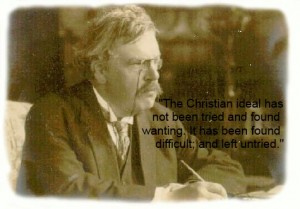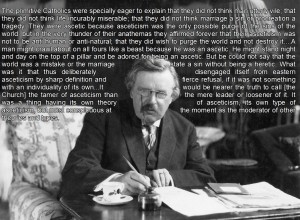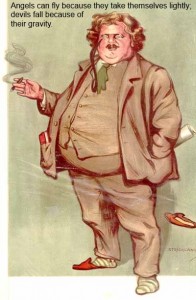
Saint G.K. Chesterton has a nice ring to it, so it was with some special joy that I read the report that the “sympathetic” bishop of Northampton is actually “seeking a suitable cleric to begin an investigation into the potential for opening a cause for Chesterton.” In other words, the relevant church authorities are finally looking to open the cause for canonizing Chesterton. There are more than a few columns (and public talks) calling for this canonization process–William Oddie and Dale Ahlquist are most prominent on this, but they’re not alone.
From the other (Catholic) side, the side which I suppose will be ultimately playing devil’s advocate [1] when the cause gets underway, I have heard very few arguments as to why Chesterton should not be a saint. Some have said that he wasn’t nearly tactful enough as a writer. I wonder if these particular detractors have read St Paul, to say nothing of the Gospels. Tact has its place, but bluntness is often needed in consulting blatant heresies. I’ve also heard an argument along the lines that he shouldn’t be canonized because of his economic outlook: that making Chesterton a saint means endorsing distributism as the “approved” economics of the Church. This particular argument strikes me as silly, at best. Laying aside any merits and demerits of distributism, when we canonize a saint we are not therefore saying that every idea or cause they undertook was necessarily holy. Canonizing Chesterton does not turn his various doctrines into Church dogma any more than canonizing Francis meant the institution of a new dress code.
The main argument against Chesterton is that he did not display heroic virtue, and if true this argument would be, shall we say, damaging to his chances of being declared a saint. I suspect that much of this charge against his heroic virtue comes from his apparently ordinary, if eccentric [2], life. He didn’t die the death of a martyr, wasn’t exiled or tortured or told under duress to recant; nor, on the other hand, did he leave all things behind to do lifelong mission work in a far and foreign land.
All of these arguments are true, and all irrelevant to his cause. Dying the death of a martyr gives glory to God, it is true, but so does living the life of a witness, and a very public witness at that. To be sure, Chesterton was not the “average” saint, but this is because the saints are anything but average. It was Chesterton who wrote that there aren’t really typical saints, but rather typical sinners–an idea later summarized by C.S. Lewis: “‘How monotonously alike all the great tyrants and conquerors have been: how gloriously different are the saints.” Chesterton does not fit the stereotype of the saints, but this doesn’t mean that he lacked their sanctity. Indeed, if he did in fact have heroic virtue, if he is in fact a saint, then the real shame would be in not proclaiming this, not providing us a model of Christian discipleship which is otherwise lacking.
 We live now in a time and place of relative sloth and complacency as regards the Faith, and at times it may take a paradox to rouse us from our spiritual drowsiness. We also live in a time when even simple common sense is called into doubt, whether by post-modern philosophy or cynical scientism which sew the seeds of doubt into modern man’s mind. “We shall look on the impossible grass and the skies with a strange courage. We shall be of those who have seen and yet have believed.” Chesterton was once called “the Prince of Paradox,” and also (by Mr Ahlquist) the “Apostle of Common Sense.” In his day, and even more so in ours, a dose of common sense and a pinch of paradox are needed, not only in defense of the supernatural Faith, but in defense of ordinary and natural things.
We live now in a time and place of relative sloth and complacency as regards the Faith, and at times it may take a paradox to rouse us from our spiritual drowsiness. We also live in a time when even simple common sense is called into doubt, whether by post-modern philosophy or cynical scientism which sew the seeds of doubt into modern man’s mind. “We shall look on the impossible grass and the skies with a strange courage. We shall be of those who have seen and yet have believed.” Chesterton was once called “the Prince of Paradox,” and also (by Mr Ahlquist) the “Apostle of Common Sense.” In his day, and even more so in ours, a dose of common sense and a pinch of paradox are needed, not only in defense of the supernatural Faith, but in defense of ordinary and natural things.
He was a conversationalist, like many of the Church’s great thinkers. And if his polemics were at times blunt, they were generally also charitable. As Dr Willaim Oddie noted in his address to the 2009 Chesterton Society’s meeting “On the Holiness of G.K. Chesterton,”
Chesterton’s intellect was entirely suffused by his faith; his heart was filled by a hope that welled up from his unfailing gratitude for the gift of life. As for his charity, we can say that Schopenhauer was one of the very few exceptions that prove the rule: nowhere in general do we see it more clearly than in his love for his intellectual opponents. He was, as I have said, like the saints of the early Church, a controversialist. He was a controversialist because he hated heresy: but he had an extraordinary capacity for loving the heretic: he might have come to love Schopenhauer if they had actually met, as he did frequently meet Shaw and Wells: he might even have cheered him up. In controversy, no matter how fierce, as Belloc wrote after his death, “…he seemed always to be in a mood not only of comprehension for his opponent but of admiration for some quality in him…. it was this in him which made him, with other qualities, so universally beloved.”
His was also an age of complacency and sloth, and he resisted both of these things. Many of the martyrs have died during ages of hard persecution. Chesterton did not live in such a time or place, yet there was no shortage of challenges to the faith, or opportunities to die to self in pursuit of the Gospels. He counted many of the leading intellectuals of the day among his friends, and they were often his debate opponents — this, in a time when the intellectuals were growing hostile to God and to the Church. How easy it would have been to give up, to join his friends in their skepticism, but he went the other way (as it were) and joined the Catholic Church, which was an even greater scandal to the smart set. He lost more than a few friends in this conversion (a too common experience for Catholic converts), and saw many others challenge him in his faith — not to become a better Catholic, but rather to cease being Christian at all.
If Chesterton’s was the age of complacency and sloth, it has given way to ours, which is an age of apostasy coming about in no small part because the acedia of the previous age was allowed to grow and fester. Skepticism of the supernatural has slowly turned into doubt of the natural, as we can see in the evolution of the moral landscape over the course of the last century: abortion is accepted and divorce tolerated, contraception practically prescribed, sexual deviancy celebrated, the list goes on and on. The intellectuals who were in Chesterton’s day becoming hostile to the God and His Church have in our become entrenched in that hostility. More than a few who are not will point to Chesterton as a reason not to.
In a time of complacency, of growing doubts and even despair, Chesterton wrote with an energy with was rooted in faith and a hope rooted in Truth. Sure, he wasn’t our picture of the average saint: ascetic, persecuted, or a humorless hermit [3]. Perhaps this is in part because he recognized that grace builds on and perfects nature, which means in turn that “Saint Gilbert the humorless ascetic hermit” would be as much a contradiction in terms as “Saint Thomas Aquinas the anonymous monk,” “Saint Dominic the parish priest,” or “Saint Catherine of Siena the silent sister.” He understood that to become a saint, one must also pursue one’s vocation, one’s calling from God. His was to be controversial in defense of Truth, and ultimately not only of faith but even of reason.
He may have had an otherwise apparently “normal” and “ordinary” life—if any person’s life may be called “ordinary.” Such an ordinariness in such an age of sloth as his should have bred complacency, which slowly rots the soul and turns the mind and the heart from the things above to the things here below, but it didn’t. It also seems to me that Chesterton overcame this particular temptation while living in the world. It is true that the Christian ascetics tend to keep their faith in God, but this is in turn because the point of asceticism is to become completely detached from the worldly comforts so as to seek succor from God alone; asceticism is, in other words, a mere tool used to train certain saints, though it is just a tool and can be taken too far [4].

The Christian ascetic helps one recognize that he has become too attached to earthly pleasures or worldly riches, and so seeks to detach himself from these by a radical rejection, a sort of spiritual intervention. He also recognizes, if he is really seeking to become holy, that not all men suffer from the same sins as he does, and that not all people are attached to worldly goods so much as he is. Saint Anthony left for the desert, and others followed him there: but he did not insist that all men needed to live as hermits. When, as a venerable old man, he left his desert hermitage to speak to the society of his day, it was not to condemn them for living as a civilization, not to condemn them for having wealth nor the occasional pleasure in life, but rather to condemn a heresy (Arianism) which he could see threatening both the faith and ultimately the social order.
The martyr, likewise, recognizes that not all men are called to martyrdom, that is, not all men are called to die in persecutions. This is why the early martyrs—and their contemporary companions—would not as a rule yield the names of other Christians (heretic or otherwise) to tyrant or torturer. They recognized that it was an honor to have been called in this way to bear witness to the Truth, but that this honor was not to be forced upon others, that this was not the only way to heaven. Indeed, that Way is a Person, not merely a particular action or form of life. He must be followed, His voice heeded, His commandments obeyed: but while these things have a definite ad transcendent reality, an objective “What” or “Whom,” the “How” is more particular to each person’s own life, his own gifts and talents and weaknesses, his own calling.

For many saints, heroic virtue meant persevering in faith during times of hardship and persecution. For Chesterton, it meant persevering in faith during times of sloth and complacency. For the violently persecuted, heroic virtue meant persevering in hope, knowing that heaven was the only hope they had; for Chesterton, it meant persevering in hope in heaven during an age of the hope in mankind. The ascetics loved God and man, because they had rejected all other possessions and comforts and so could love nothing else; Chesterton loved God and men despite the temptation to love those things he was allowed to have. Many of the “ideal” saints were faithful to God only after rejecting the sufferings of the world’s evils, but Chesterton was faithful to God after resisting the siren calls of the world’s pleasures. They are witnesses of how a saint can live an extraordinary life, but Chesterton is an example of God’s sanctity at work in a man’s ordinary life. His witness to God is that even an ordinary man might be made holy by God’s grace: because even “ordinary holiness” is ultimately a response to God’s extraordinary gift of grace.
Chesterton is for us another model of holiness, and one of a type which is I think sorely lacking in the Church. He is a model of how to be holy while living an otherwise ordinary life: for the majority of men are not called to be hermits or monks, priests or foreign missionaries; nor are most women necessarily called to be sisters and nuns n cloisters, nor anchoresses nor martyrs. Yet every man is called to holiness and virtue; every woman is called to sanctity and graces. We are especially called, all of us, to faith, hope, and charity: to love, and then to joy. Blessed Mother Teresa of Calcutta once advised, “Do not think that love, in order to be genuine, has to be extraordinary. What we need is to love without getting tired.” This advice is born out, not only in her rather extraordinary life, but in Chesterton’s own seemingly ordinary one.
—Footnotes—
[1] This is also a very important role in the canonization process, so I’m not saying this to “savage” those Catholics who oppose the canonization of Chesterton. In some sense I actually encourage them to play this part, but I’d prefer they wait until the cause is actually underway rather than working to prevent the cause entirely.
[2] A certain segment of society would be scandalized by the sight of a saint carrying a sword-stick.
[3] And why, exactly, should a hermit be humorless? Yet I get the impression that Chesterton’s mirth has somehow been an impediment to his cause.
[4] For example, the Albigensian heresy combated by Saint Dominic (directly) and Saint Francis (indirectly) took an extreme form of asceticism which rejected not only worldly comforts, but even worldly necessities. The Manichaeans—and the Albigensians and Cathar were neo-Manichaean—rejected not only the allure of this world but even the fact of bodily existence in this world.






2 thoughts on “Canonizing Chesterton, Heroic Virtue, and Ordinary Life”
Pingback: Canonizing Chesterton, Heroic Virtue, and Ordinary Life - CATHOLIC FEAST - Every day is a Celebration
Pingback: The Saint Who Took Part in the Crusades - BigPulpit.com